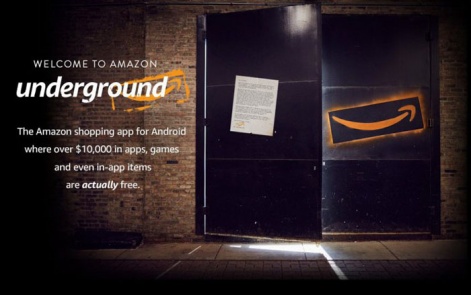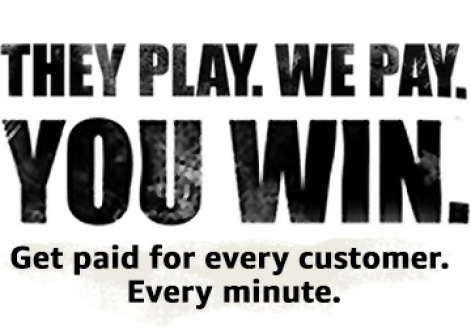Surprisingly, perhaps, there are growing structural forces against free-to-play mobile games.
So in this week's Mobile Mavens, we're considering one of the most ambitious, and potentially most accessible: Amazon Underground.
It is a platform which provides free games for consumers, while paying developers $0.002 per minute of gameplay generated in their games.
We asked the Mavens:
- You do think this will be appealing to consumers and developers, perhaps even encouraging a new type of longevity-based game design?
Given the reluctance of gamers to make $0.99 app and/or in-app purchases, this is an interesting model in that Amazon is guaranteeing a revenue stream based on playtime.
What’s more, the apps don’t have to be modified for this. The ads run at launch or re-launch. The games can still have in-game ads as well.

It could be a model that appeals to developers creating high quality premium titles, but the revenue would be a fraction of a 99¢ purchase. To earn 70% of $0.99 at $0.002/minute of game play … you would need to see nearly 6 hours of play time from an individual player.
It does make things easier for the developers and if a game doesn’t have in-game ads, it is probably less annoying to players.
It probably addresses the issues of ad-blockers. Users presumably won't block these ads (or the system won’t allow the games to run if they are blocked).
All very interesting.

A games programmer before joining Sony’s early PlayStation team in 1994, he then founded developer Pure Entertainment, which IPO’d and launched a free-to-play online gaming service way back in 1999.
He was also a director of pioneering motion gaming startup In2Games, which was sold to a US group in 2008.
Along the way, he’s been a corporate VP, troubleshooter, and non-exec to a variety of companies and investors in and around the games sector.
Harry was European CEO of Marvelous AQL, a Japanese developer and publisher of social, mobile and console games, known for console games like No More Heroes and Harvest Moon, but now highly successful in the free-to-play mobile and web space in Japan and Asia.
Harry is CEO of Magicave.
I've been saying for years that this is the inevitable business model we end up with for content - i.e. wrapped up with music, video etc in an 'all you can eat' service where a (hopefully) benevolent overlord distributes revenue according to usage.
It has pros and cons - we need to look at how streaming has impacted the music industry - it's grown digital revenues and squeezed some revenue out of those that don't/won't pay for content.
The danger is the potential for continued erosion of revenues from the content creator in favour of the distributor.Harry Holmwood
And more and more people are happy to sign up for services like Netflix, Spotify or indeed Amazon Prime that give them a great, ad-free service for a few dollars a month, and, in some cases, also use that same interface to sell newer, premium content to users.
The danger, of course, is the potential for continued erosion of revenues from the content creator in favour of the distributor, who becomes more and more entrenched as users get used to 'free' content consumption as the norm.
Developers have escaped the clutches of retail and physical distribution, are currently in the kindly embrace of Steam, Apple, Google etc who offer a great service for a small cut but could soon be looking back on these tough times as the good old days. Once consumers cease paying for a specific piece of content or service, developers will depend even more on whatever slice (or crumbs) of the pie the new distribution giants decide they deserve.
Whatever the pros and cons of such a service, it's unlikely that progress can be fought and so we need to work with it to make the best of the inevitable.
To answer the actual question posed, yes, I think this new revenue stream is likely to see longevity-based design. The market is dictating game design choices all the time - F2P has obviously impacted the kind of games we're seeing, as has YouTube led to a whole host of games seemingly designed primarily to provide novel and amusing content for people to stream.

Tony’s career has covered the whole spectrum from AAA console to handheld, mobile and flash titles, working on huge franchises such as Grand Theft Auto, Red Dead Redemption, and Call of Duty.
In 2015 he founded Ant Workshop to develop his own titles and to offer his experience as a design consultant.
I think that, like F2P before it, it's well suited to some games, and utterly terrible for others.Tony Gowland
I think that, like F2P as the "one true all-encompassing business model" before it, it's well suited to some games, and utterly terrible for others. Seems like it'd be giving devs making short but sweet experiences like Monument Valley a rough deal.
Anecdotally I've already heard from a number of teams moving existing games that (they claim) have good retention and session length but poor conversion over to this model - infinite runners and simple puzzle games with lots of content seem popular genres that could be good fits.
Overall I think it's great that devs to have another option to look at, though from what I've seen & read (I haven't actually played any Underground stuff myself), Amazon's implementation of the storefront for getting these games is not terribly user-friendly which could cause the whole experiment to stumble while it's still early.
I think it's a very interesting move… I think I may have made some point about "Steam for mobile" in a Mavens earlier this year.
Well I guess this is quite close. They've gone with the name "Underground" which to me at least makes it sound like it's targeted at "indie" devs, although a quick glance at the titles available shows plenty from larger studios. Disney, Sega, Zynga, Gameloft, G5…
Will this turn into a bit of a "care home" for older games?David MacQueen
And it's mostly older titles as well, probably well past the peak of revenue they may have had in the past. So, will this turn into a bit of a "care home" for older games?
I'm being a bit harsh there, some of them are pretty decent games even if they aren't exactly fresh any more. But it looks like the way it's going already.
8 and a bit hours for a dollar of revenue seems quite a lot, but I'm pretty sure Amazon must have "done the math" as Americans say and it is likely comparable to the revenue for a typical freemium game per average gameplay time. And if they are older titles, publishers are probably quite happy to have low revenues, as opposed to no revenues.
So, basically, I wonder how much like a Steam this will turn out, or is it more like one of those channels on TV that shows repeats of classic old shows?
I don’t believe in ‘benevolent overlords’. IMHO it is the overlords that cash in on this model and that only a tiny proportion of content providers make decent returns.
To me this simply smacks of Amazon attempting to attract a critical mass of games to their platform; games that have already been developed and (possibly) market-validated at someone else’s expense.
Don’t get me wrong, if the model works for developers that will be fab. However, I fail to see how a game that was designed around a F2P business model can suddenly make sense when all those IAPs become free. Surely that will destroy (or, at least, badly impact on) all sense of pacing, player progression, achievement and, in doing so, also f*ck up the game economy?

I currently work on a mobile F2P social casino platform. How would that work in Amazon Underground? “Place all the best you want and never worry about losing”. That kind of defeats the purpose, players want to feel the excitement of a ‘big win’ and a sense of risk.
How would it work in a car racing sim or combat RPG? “Have all the car upgrades and fuel you could ever need”? “No need to earn your stripes, have the biggest guns and all the ammo straight away….just like every other player”. Seems daft to me.
You would need a LOT of players playing for a long time to make this viable.Kevin Corti
OK, games can still run ads – or run even more ads – but the basic principles of a commercially viable F2P game disappear here (X% of players convert to paying and pay enough over their lifetime to return a meaningful profit over the game’s lifespan to cover development, live ops and marketing).
The development costs won’t change. Live ops costs may fall somewhat. Marketing still needs to happen. Amazon won’t suddenly give you 10 million players for free.
The economics seem pretty crazy too. William calculated that in order to return the same revenue as a $0.99 premium price, every player needs to play for 6 hours. That’s a very tall order for most games. You would need a LOT of players playing for a long time to make this viable. If your game can achieve this, it is probably already doing rather well as it is already so why would you stick it on Underground and cannibalize those revenues?
If this is some bold move to enable the design and development of a brave new raft of ‘non F2P-like’ games then I’m interested to see what comes about. I think it is more likely to become the last refuge for a bunch of failed F2P games from desperate developers or a place for publishers with big portfolios to dump all those elderly games with no risk.
I'm like Harry, I've been expecting this. When apps and software stop being profitable we tend to just shut them off as developers. This is especially true with the unnecessary twice a year OS updates, yearly device updates, and persistent server connection games.
I'm expecting the next step to be a subscription service for all you can eat games like Nvidia's Grid service ala Netflix.
The Amazon Underground app is confusing though. I got it loaded on my Shield tablet, but couldn't get it installed on my Fire Phone. I just tried again to make sure I wasn't crazy and it still fails. After loading it you realize it is not an app store at first. It is like a weird Amazon.com home page with a banner image at the top for the app store.
There are ads once in awhile for Amazon products and services. I wonder if the Amazon API required to be on the store can easily make a paid submitted app for the normal Amazon App Store setup for the Underground store?
It has been cool playing the $9.99 DuckTails app and others for free. Is my 5 mins worth a penny to the dev, it sure is!

Oscar Clark has been a pioneer in online, mobile, and console social games services since 1998. He is also author of the book, Games As A Service – How Free To Play Design Can Make Better Games.
This is a very interesting idea and one which differs from both subscription and premium elements than went before.
Pay a developer for the level of engagement each player has with that game.

Brilliant, and on the surface it sounds like a deal no-one can turn down but I worry this approach risks ignoring all the positive lessons we have found from free-to-play models - and yes there are some even if you don't like every game.
- First, upfront ads provide a barrier to play, an inconvenience, rather than using opt-in ad models to trigger anticipation and above all player choice.
- A lack of in-app purchase at all prohibits the potential of games to add interesting premium twists for paying players. Furthermore this model does nothing to help create an expectation of future value (a key element identified in research into why people pay for in-app purchase).
- Next there is the problem which subscription MMOs fell into - a fixed (in this case free) subscription provides no means to up-sell the player, significantly limiting the scope of the business opportunity (which means its going to become a case of diminishing returns as quality/costs rise over time). Without the potential for scale the business of games will struggle to survive in the long run.
- Then there is the Spotify experience where pop tracks are continuously replayed by a small group of hardcore fans assigning them the majority of the income, despite a much greater numbers of individuals (and hence advertising eyeballs) attracted to a wider range of bands - the payout of $0.002 per minute of gameplay may not be as equalising as it seems in practice.
So it's a bold experiment and I can't wait to see its results - but it's only one of the multitude of flavours of possible monetisation and one which leaves a number of questions yet unanswered.



























